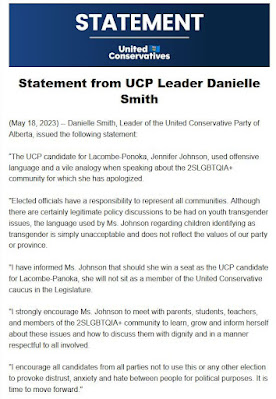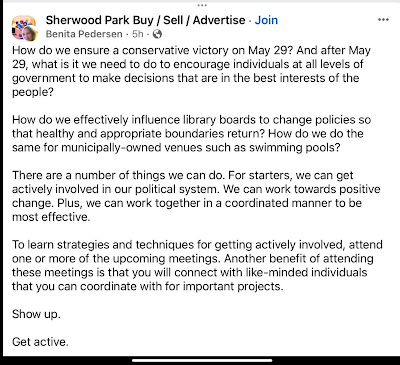A couple of years ago, I expressed my disgust with partisan politics and proposed a model that is intended to break the connection between party discipline, insularity, and policy platforms.
One of the first things Danielle Smith has proposed in the wake of the UCP being shut out in Edmonton is literally creating a partisan committee of failed Edmonton UCP candidates from Edmonton to “advise” the government about matters pertaining to Edmonton.
I want to point something out here about how wrong this is within a parliamentary system. Edmonton has duly elected representatives in the legislature. Those are the people that Smith should be consulting with about matters regarding Edmonton, or the impact of government legislation or policy on Edmonton. However, because they belong to “The Other Party”, she seems to have decided that rather than consult with them, she’ll form up a committee from within the UCP.
The Problem
Not only is this grossly disrespectful of the voters of Edmonton, it effectively imposes on them a group of partisan “representatives” that they did not elect in the first place. At its core, this is fundamentally undermining the purpose of representative democracy in the first place. Edmonton elected those people as their MLAs, it is incumbent upon the governing party to find ways to work with them.
However, in today’s world, the party comes first, the riding and the people second. This is backwards.
We see the same thing federally as well. When a Liberal government is elected, very often they have scant or even no representation from the Prairie provinces. The government then struggles to consult adequately to understand how their policies might impact that region (which, of course the conservatives play up because … well, party first!).
One of the guiding principles of any parliamentary system is the idea of collegiality. That is to say, your fellow MLAs/MPs (whatever the title) are in fact your peers, and you should be able to engage with them as needed, in the most appropriate way. This notion of collegiality is also a moderator of partisan behaviour because it puts representation ahead of partisanship.
In essence, the thinking should be “I need your input on this matter because you represent this other region or perspective, and the fact you belong to another party shouldn’t matter”. Instead, what has happened over the last 30+ years is that the notion of party as primary has created a wall that inhibits that collegial relationship, and instead enforces a “don’t talk to the other guy because they’re from the other camp” mentality.
Party As An Artifact
The political party of today is largely an artifact of the 19th century and the Industrial Revolution. In theory, they provide a means to present to the people a coherent political platform that is grounded in some stream of political theory as to how best run a nation.
That was then, this is now. The political musings of philosophers in the 19th century only provide the barest fig leaf of theory that informs today’s political parties. Today’s “Liberals” are not particularly reflective of what was deemed “liberalism”, the “Conservatives” have minimal connections to the thinkers they often refer to as well. The NDP (Canada’s equivalent of “Social Democrats” elsewhere) are a puzzling mishmash of ideas and tropes with only the barest of connections to the concepts of social democracy.
In so many ways, today’s political parties exist as an artifact of a time long past.
What Parties Have Become
Instead, political parties have become sorting hats for those who seek political power. Party executives sit behind closed doors, but exert enormous influence over elected MLAs, and the decisions about who gets a seat at the cabinet table; Party discipline is used to ensure that Cabinet gets its legislation passed; Party discipline dictates which MLAs get to speak out on issues, with some being designated “disruptors”, others being told (more or less) to keep their mouths shut. Above all else, party discipline gets used to prevent elected representatives from interacting with each other, and thereby moderating their party’s worst instincts.
The UCP embodies this so clearly. Formed in 2016/17, it was always a vehicle for one person to ride to power - Jason Kenney. An examination of the Party Constitution and other governing documents shows how much power over the party is placed in the hands of the leader and the party executive. This is no accident, but it is also a fatal weakness. In fall of 2022, Take Back Alberta (TBA) exploited that weakness to effectively stage a coup and take control of the UCP board.
If you don’t think that’s significant, consider the fact that TBA and Danielle Smith decided to “shelve” the most controversial aspects of their platforms until _AFTER_ the provincial election. That should have sent shockwaves of discomfort through the electorate - a party literally saying “we won’t talk about the big parts of our platform until after you elect us” should have been a death sentence to their campaign. It wasn’t for a number of reasons, but what it did demonstrate is that it is now possible for a party to lie entirely about what it represents and believes in order to get elected, and once in power, well, then you find out what they really believe.
Impact On Parliamentary Democracy
The impact of these changes on parliamentary democracy are significant and should not be ignored. First, it undermines the notion of your MP / MLA as your representative in the government. Instead, they are representing the party to you, and are beholden to the structure of party discipline in terms of how they vote in the legislature. This is backwards.
Second, the rise of partisanship-first politics has meant that suddenly the member from the adjacent riding who belongs to another party is seen as a rival rather than as a colleague. This automatically causes MLAs to discount the commentary from that other member, and ultimately results in discussions being limited, and debates in the legislature itself have become a matter of “scoring points”. This mentality really took hold when Stephen Harper gave his MPs a “How To Disrupt Parliament” manual. That manual was literally no less than a deliberate effort to undermine the effectiveness of parliamentary structures that all rely on the presence of a fundamentally collegial relationship between MPs.
Today, debates on matters of substance are replaced with designated MPs trying to “score hits”, and Question Period has become a farce. This isn’t a hockey game, people. It’s not about “outfoxing the other guy”, it’s about governing the country for all of us.
The Role Of Collegiality
The concept of collegiality in parliament is important because it serves to act as a moderator of the actions of those in power. By undermining it to the degree that we have seen over the last 30 years, political parties have become ever more extreme and strident in their pursuit of some kind of ideological perfection to the detriment of many who may otherwise agree with some portion of those ideas.
Having to reach out to colleagues you don’t agree with ideologically is a moderator. It means that parties and party leadership actually hear what the “other side” is thinking and the reasoning behind it. When was the last time you think that parties were able to do that? For me, it was sometime in the 1980s, possibly earlier than that.
Today? It’s hard to imagine a member of the conservative caucuses reaching out to a peer in another party and engaging in sincere, reciprocal conversation. I just don’t think it happens now - the constant drone of attacks, even on matters that are relatively trivial tells me that we have become far too focused on power for its own sake.
Conclusions
The next 4 years in Alberta are going to be horrific. David Parker and TBA are not a “collegial” organization, and neither is the UCP. Although the UCP has a slim majority, it’s enough that they can get away with a lot, and I do not expect them to moderate their tendencies towards authoritarianism, if not outright fascism.
Democracy in Canada is at a crossroads, and if we do not take dramatic steps to change course, it will fall apart in my lifetime. I don’t know what would replace it, but I do know that the path we are on leads to some very dark places.


